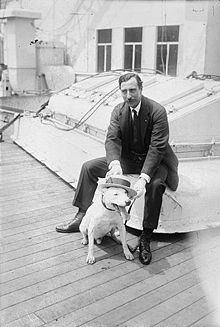Ernest Schelling
Ernest Schelling (born July 26, 1878 in Belvidere (New Jersey) , † December 8, 1939 in Manhattan ) was an American pianist, composer and conductor. Schelling wrote numerous pieces for piano, orchestra and chamber orchestra, which were performed during his lifetime. His best-known work is the symphonic poem A Victory Ball.
Life
Schelling received his first music lessons from his father and made his first appearance as a pianist in Philadelphia at the age of four . At the age of seven he continued his musical education in Paris . At the age of twenty he became Ignacy Paderewski's pupil . At the beginning of the 20th century he toured Europe, North and South America, which established his reputation as a pianist. He became court musician of the Countess of Mecklenburg-Schwerin and began to compose during this time. In 1913 he was elected to the National Institute of Arts and Letters .
In 1917 he went to the Military Intelligence Corps and served during the First World War . He received high military awards and retired from service at the end of the war with the rank of major .
From 1924 he conducted the “Young People's Concerts”, the children's concerts of the New York Philharmonic . This great task would determine all of his subsequent life. The concerts were a combination of lectures, slides and orchestral samples designed to help children understand and love music. He moved across America from Philadelphia to Los Angeles to London and Rotterdam.
From 1936 to 1938 Schelling was also music director of the Baltimore Symphony Orchestra .
Schelling organized charity events for composers, worked for the Muscians Relief Fund and was President of the Edward MacDowell Association. He campaigned for American music to become known in Europe. On the other hand, he helped to bring many European musicians to America. B. Enrique Granados , whom he took under his wing.
Web links
- Literature by and about Ernest Schelling in the catalog of the German National Library
- Sheet music and audio files by Ernest Schelling in the International Music Score Library Project
- Biography (English)
- Ernest Schelling: Impressions from an artist's life: symphonic variations for orchestra and piano. Published by FEC Leuckart, Leipzig 1924 and Carl Fischer, New York
Individual evidence
- ^ Members: Ernest Schelling. American Academy of Arts and Letters, accessed April 24, 2019 .
| personal data | |
|---|---|
| SURNAME | Schelling, Ernest |
| BRIEF DESCRIPTION | American composer, pianist and conductor |
| DATE OF BIRTH | July 26, 1878 |
| PLACE OF BIRTH | Belvidere, New Jersey |
| DATE OF DEATH | December 8, 1939 |
| Place of death | Manhattan |
